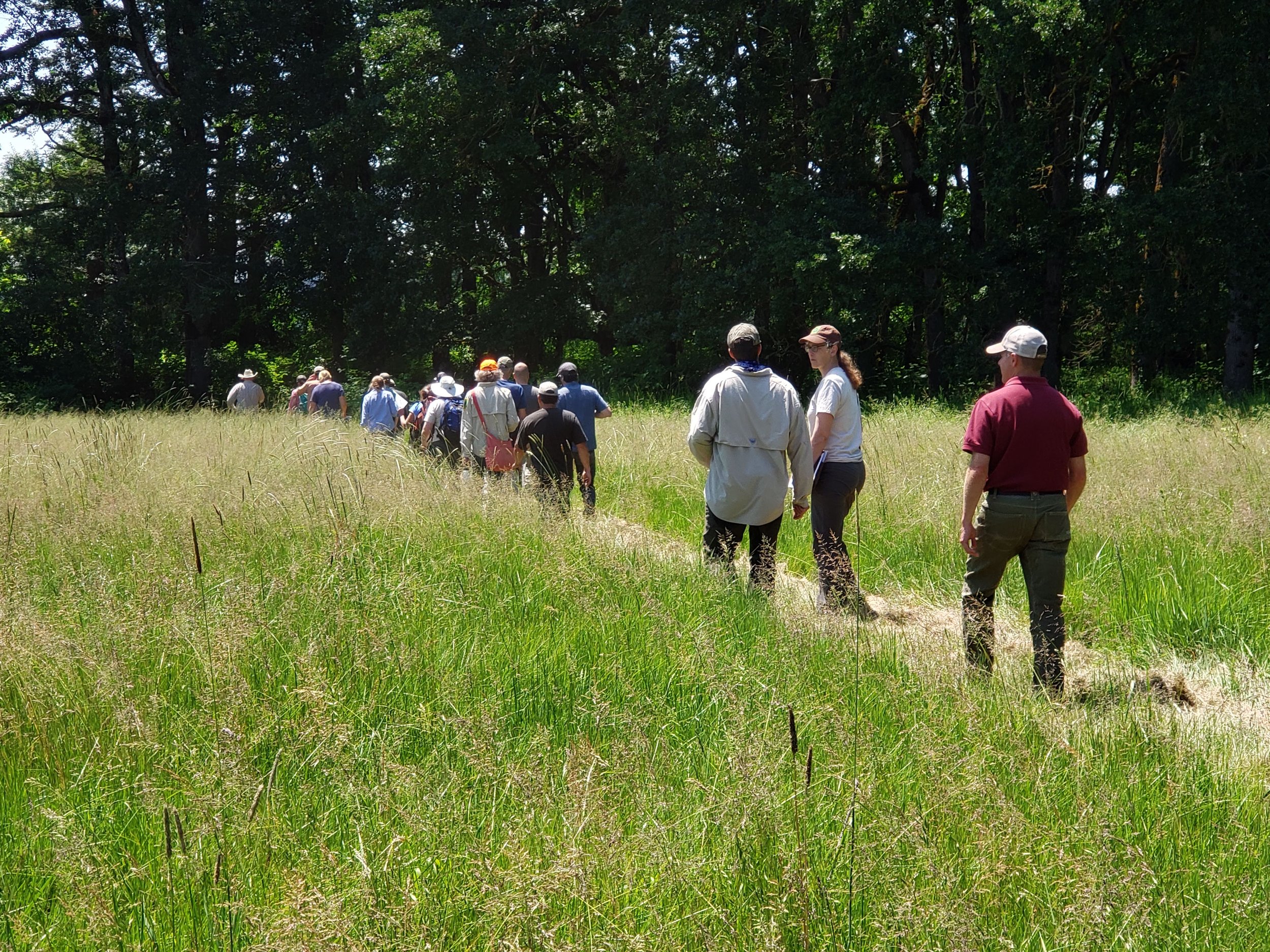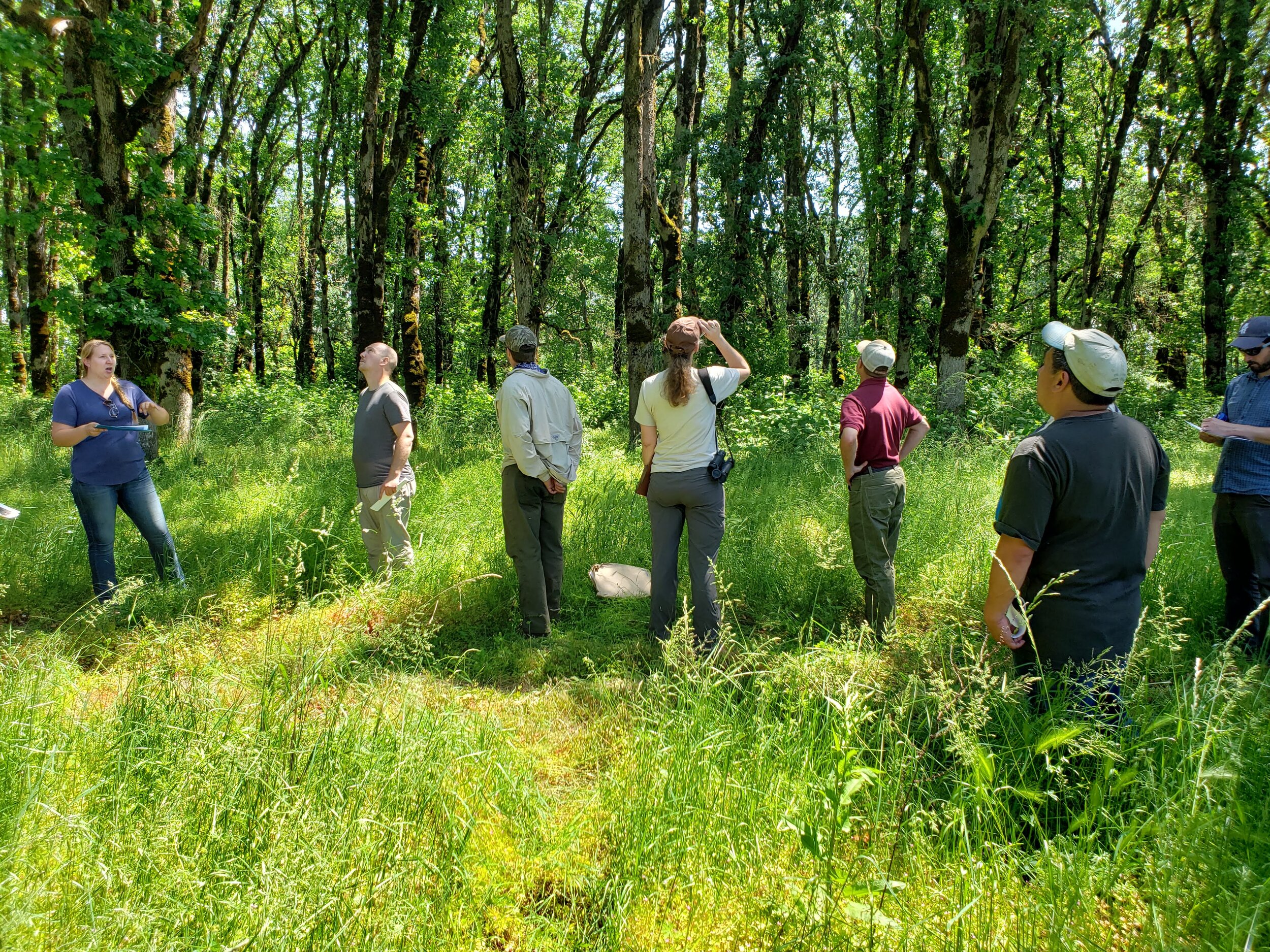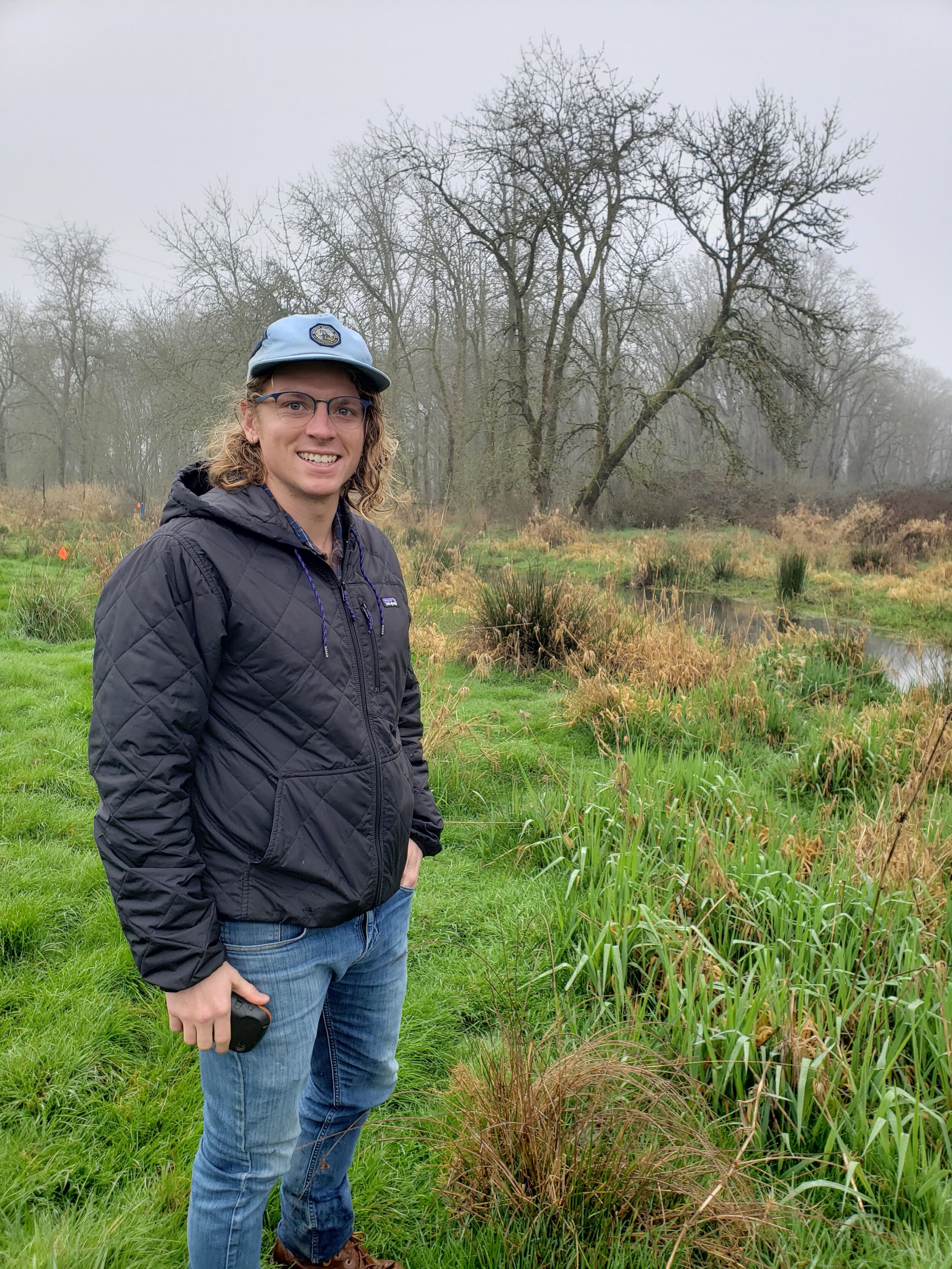Video Credit: Josh Seekatz
Project Conclusion:
Oak Haven Special Project, January 23, 2017 - September 8, 2021
In January of 2017, The Bridges Foundation purchased an 82-acre parcel featuring mature Oregon white oak forest and adjoining pasture land. The purchase was made possible by assistance provided by Craft3. In April 2018, The Bridges Foundation purchased an adjoining 29.2 acres. Following a Property Line Adjustment and Partition, in 2021, 102.3 acres known as “Oak Haven” was sold to the Confederated Tribes of Siletz Indians to be protected forever through a conservation easement. Oak Haven includes approximately 35 acres in oak woodland, 9 acres in riparian habitat, 13 acres in upland grass and 46 acres in wetland prairie and upland wetland habitat. Efforts will begin to restore the landscape. Funds for the Oak Haven Project were provided by Bonneville Power Administration and implemented by Oregon Department of Fish & Wildlife through the Willamette Wildlife Mitigation Program (WWMP). The acres at Oak Haven adjoins another 720 acres of conserved wetland, all of which is located in the Santiam Valley, east of I-5 and south of Salem. The land acquired by the Confederated Tribes of Siletz Indians will remain in a perpetual conservation easement held by the Bonneville Power Administration with the goal to conserve and restore this area.
As background, the “Oak Haven” property was previously sold with the intent to log the oak forest and convert the ground into a filbert orchard. The sale did not go through. The Trustees of The Bridges Foundation realized that large parcels of undisturbed oak forest are rare in the Willamette Valley and deserved immediate protection. The Trustees acted quickly with support from Craft3. The goal of The Bridges Foundation was to protect the mature oak and restore the upland prairie and protect this unique habitat through a conservation easement.
Oak Habitat: It’s now estimated that more than 99 percent of pre-settlement prairies and savannas in Oregon have been converted to urban areas, farms, and other developments. Regrettably, only 1% of Oregon white oak forest (Quercus garryana) remains today in the Willamette Valley. Historically, periodic fires were a major factor maintaining Oregon white oak woodlands. As native land gave way to cultivation by settlers, fire used by Native Americans ceased. Since then, open Oregon white oak forests have been overtaken by Douglas-fir. Fire prevention may cause continued decline in the extent of Oregon white oak forests. In addition to major changes to the ecosystem and urban development, another challenge to this native tree is the spread of invasive plant species. In order to germinate, acorns need to be kept moist in soil or under leaf litter. Unfortunately, invasive, non-native plants like Scotch broom and Himalayan blackberry reduce the survival and growth rate of oak seedlings.
Craft3 is a non-profit corporation that provides loans to strengthen economic, ecological, and family resilience in Oregon and Washington. Craft3 assisted The Bridges Foundation to protect a low topography Oregon oak woodland as part of Craft3’s mission to support land conservation through the Conservation Bridge Fund. The Bridges Foundation thanks Craft3, and especially Brad Hunter, VP, Senior Business Lender, for believing in this project and providing the support needed to make this effort possible.
wwmp Technical review team
The Confederated Tribes of Siletz Indians have an interest in acquiring land near Salem which will provide a learning environment for education and cultural exchanges. The Tribe's Salem area office staff will begin to engage local members to identify and prioritize cultural resource opportunities, recreational opportunities, and management activities at the property. Special thanks are shared with Mike Kennedy, Natural Resources Director, Megan Zarzycki and Josh Skeekatz, Wildlife Biologists, and Stan van de Wetering, Biological Programs Director, for their considerable assistance throughout this process.
Josh Seekatz, Conservation Lands Biologist, Confederated Tribes of Siletz Indians
In 2010, Bonneville Power Administration (BPA) entered into an agreement with Oregon Department of Fish & Wildlife. This agreement was entitled, “The Willamette River Basin Memorandum of Agreement Regarding Wildlife Habitat Protection and Enhancement.” This agreement established goals for mitigating the effects caused by the construction, inundation, and operation of the Willamette River Basin Flood Control Projects.
The Willamette River Basin Flood Control Projects address some of the impacts caused by the construction and operation of 13 dams (operated by the U.S. Army Corps of Engineers). The goals for the dams were to provide critical flood damage reduction for the Willamette Valley. In addition, the dams provide hydroelectric generation, recreational and fishing opportunities, water quality benefits, and municipal and irrigation water. The destruction of riparian and wetland habitats caused by construction of the dams proved to be especially threatening to salmon and related ecosystems which are needed for the spawning and propagation of salmon smolts.
Under the terms of the Agreement, the State of Oregon and the Bonneville Power Administration agreed to acquire an additional 16,880 acres of land with the goal to conserve wildlife habitat by the end of 2025. This was in addition to 9,657 acres previously purchased to protect critical riparian areas and adjoining salmon riverbeds. To accomplish this, the parties established the Willamette Wildlife Mitigation Program (WWMP), which is managed by the Oregon Department of Fish and Wildlife (ODFW).
ODFW established a Technical Review Team and the Wildlife Advisory Group which are comprised of federal, state, and local agencies, conservation organizations, academic institutions, the three Tribes named in the Memorandum Of Agreement (Confederated Tribes of Siletz Indians, Confederated Tribes of Grand Ronde, and Confederated Tribes of the Warm Springs) and others with expertise ODFW felt was beneficial to the program. The Technical Review Team helps to select appropriate projects for acquisition by scoring and ranking projects using program criteria. The Wildlife Advisory Group develops criteria, reviews proposed projects and provides technical and policy support to assist in implementing the Agreement.
Sincere appreciation is extended to the interactive and committed team working with the Willamette Wildlife Mitigation Program and with the Bonneville Power Administration for their leadership and assistance in making the Oak Haven project a reality.
Conservation efforts adjoining “Oak Haven”:
720 acres noted in blue. Oak Haven (102.30 acres) noted in green.
Following is background information about the “Oak Haven” Project.
May 31, 2017 -- Planning for the Audubon Society of Portland Eclipse Event, Nick Hardigg, Executive Director; Mark Fitzsimons, Birdathon Coordinator; Luke Fitzpatrick, The Bridges Foundation, and Jane Hartline, Eclipse Event Coordinator
120 campers, using rv's and tents, enjoyed the weekend. check out the bird list (PDF).
Enjoy 340 photos of the eclipse event, provided by woodfern studios nature & wildlife photography
Nick Hardigg, Executive Director and jane hartline, eclipse event coordinator
august 21, 2017 -- Enjoying the eclipse event in oak haven with audubon society of Oregon (Jane hartline (left) and kathy bridges, the bridges foundation
120 campers enjoyed the eclipse weekend event.
Caption Above: Megan Zarzycki, Wildlife Program Biologist, Confederated Tribes of Siletz Indians, provides an overview and history of the site with federal and state agencies.
Josh Seekatz, Conservation Lands Biologist, Confederated Tribes of Siletz Indians, developing the baseline data for Oak Haven. Josh prepared the "Flora of Oak Haven" (PDF) with 117 species identified as of May, 2020.
Photo credit: Josh Seekatz, Conservation Lands Biologist, Confederated Tribes of Siletz Indians, November, 2019
Read Craft3 Announcements:
The Bridges Foundation, January 27, 2017
at a GLANCE, 2017, Issue 2
Conservation Loan
Press Release, April 7, 2017: "80 acres of unique mature oak habitat protected in the Willamette Valley"
Statesman-Journal, April 17, 2017
"The Business Of Taking Care of Wetlands"
Bonneville Power Administration, July, 2021
"Property acquisition near Salem to benefit fish and wildlife in Oregon"
To learn more about Oregon white oak:
https://www.blm.gov/or/districts/salem/files/white_oak_guide.pdf
https://www.dfw.state.or.us/wildlife/willamette_wmp/index.asp
















